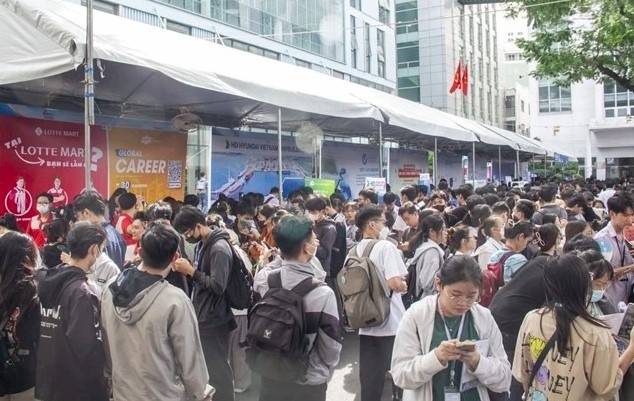HCM City needs 330,000 workers next year
Ho Chi Minh City will need some 310,000 - 330,000 workers for job vacancies next year, according to the latest survey of the city’s Human Resources Forecasting and Labour Market Information (Falmi) Centre.

The survey was conducted at more than 64,100 local firms.
Of that figure, more than 88% of the jobs will require trained employees.
In the first quarter of 2025, the city will require about 79,000 - 84,000 workers for jobs in marketing, sales, market research, advertising, logistics, tourism services, restaurants-hotels, packaging, electricians, housekeeping, and security.
About 77,000 - 82,000 workers are needed in the second quarter, 75,500 - 80,500 in the following three months, and another 78,500 - 83,500 for the last quarter.
The commerce and service sectors account for 67.7% of hiring needs, the industry and construction sectors 31.8%, while agricultural, forestry and fisheries sectors 0.5%.
The centre advised job seekers to maintain a professional working attitude and work ethics, while also arming themselves with professional knowledge, professional abilities and soft skills relevant to the job role.
Employees must also stay current with emerging technologies and enhance their proficiency in foreign languages and information technology.
The city plans to improve the quality of vocational education and training to meet development needs.
In response to the city's slowing labour productivity growth, the HCM City People’s Committee has issued a labour and employment strategy for the 2023 - 2025 period, with a vision to 2030.
The strategy aims to increase labour performance in the city compared to the national average and to answer the need to restructure key economic sectors in strategic areas.
This move is considered a sustainable and fundamental solution, and is expected to have a multifaceted impact on the local labour market, and regional and national labour markets.
The strategy recognises that the labour market must adapt to the profound global shifts that are currently underway. As the emerging core values of the economy revolve around the twin pillars of green and digital, the labour market cannot remain immune to these transformations.



